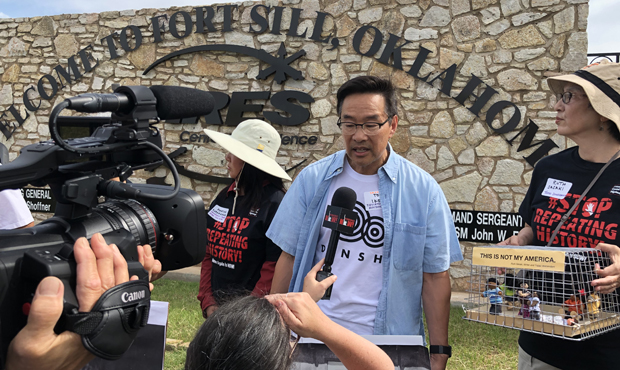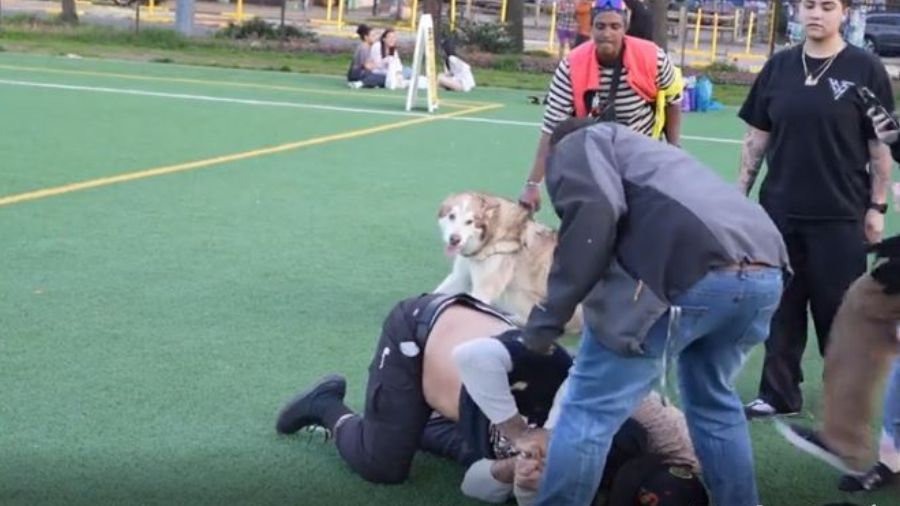Seattle historian joins Fort Sill family separation protest
Jun 24, 2019, 11:32 AM | Updated: 12:47 pm

Seattle historian of Japanese incarceration and Densho founder Tom Ikeda took part in a protest against detention of migrant children at Fort Sill in Oklahoma on Saturday. (Karen Ishizuka)
(Karen Ishizuka)
When a protest took place over the weekend at an army base in Oklahoma where the Trump administration plans to house hundreds of migrant children later this summer, a Seattle man who has devoted his life to collecting stories of the Japanese-American experience of World War II was there.
Tom Ikeda is the founder of Densho, a non-profit organization based in Seattle that collects oral histories of Japanese Americans.
“Densho was founded to preserve and share the stories of the World War II Japanese American experience, to promote equity and justice today,” Ikeda said from his home in Seattle, after returning from the protest at Fort Sill early Sunday.
For Tom Ikeda, whose parents and grandparents were incarcerated during World War II along with 120,000 other Japanese and Japanese Americans, demonstrating at Fort Sill is the next logical step after years spent hearing and recording stories of that dark chapter in American history, and not wanting history to repeat.
“What I’m saying today is actually walking my talk, because I’ve done this now for almost 25 years and have collected the stories and know the stories and the impact of sharing [those stories],” Ikeda said.
To select Fort Sill as a place to house migrant children separated from their families is particularly activating for Tom Ikeda, who has studied World War II treatment of Japanese Americans for decades.
“In the 1940s, [Fort Sill] was technically an Army or Department of Justice internment camp,” Ikeda said, who a decade ago, as part of his work for Densho, heard the story of Japanese American man from Hawaii whose Japanese father was held at Fort Sill during World War II.
Seattle group played a pivotal role in healing national wound
“He told me the story about his father, who, the day after Pearl Harbor, was picked up by the FBI,” Ikeda said. “The reason he was picked up was he was a community leader in Kona [on the Big Island]. He owned the general store. He had a small taxi business. But he was bilingual, so he helped Japanese families sometimes work with the Japanese consulate to do paperwork. And because of that connection, the FBI picked him up and first interned him in a military camp in Hawaii, and then eventually at Fort Sill.”
Ikeda said the man’s name was Kanesaburo Oshima.
“This gentleman had 11 children, and was a pillar of the community,” Ikeda said. “But when he was at Fort Sill, his son said [his father] snapped. In broad daylight, he ran to the fence, and started climbing it, and just said, ‘I want to go home. I want to go home.’”
The man was obviously under duress, Ikeda says, and the other internees yelled at the guards to not shoot him, and they tried to coax Oshima to give up.
It didn’t end well.
“The guards pulled their guns and started shooting at him,” Ikeda said. “And when Mr. Oshima came to his senses and paused and started looking back at his fellow inmates, one of the guards came up and shot him in the back of the head and killed him.”
Hearing the story of the death of Kanesaburo Oshima from Oshima’s elderly son clearly made an impact on Tom Ikeda.
“I could see the little boy in him come out. He was just traumatized by what had happened to his father. And then he told me how devastating it was for his family. This was a case of family separation during World War II and how devastating that was for a family,” Ikeda said.
And that’s why Tom Ikeda, who hasn’t done much in the way of protesting or demonstrating before, found himself taking a red-eye from Seattle to Oklahoma Friday night, and taking part in a protest at Fort Sill this past Saturday.
“Stories like that that I’ve collected as a historian resonated with me, and I just knew I had to go to Fort Sill to let the people there know what happens behind the walls at a place like Fort Sill,” Ikeda said.
Ikeda says there were about 25 Japanese-Americans from around the country at Fort Sill on Saturday, including several who had been incarcerated 75 years ago. There were also about 250 local Oklahomans there in support as well.
When the group gathered for a press conference in front of the “Welcome to Fort Sill, Oklahoma” sign, things got ugly. Military police showed up, and an MP started yelling at the group and telling the demonstrators that they had to disperse.
“I’m with Japanese-American elders, and [the MP is] screaming at us saying, ‘Don’t you people understand English?’” Ikeda said. “It was so hurtful because my dad is still alive in his 90s, a World War II vet. My mom’s brother fought in the elite Army fighting unit the 442nd, a unit that is considered the most highly decorated unit in Army history. He fought and was killed fighting to end fascism in Europe and give Japanese-Americans a voice. And so it was so hurtful and ironic that I had this U.S. soldier yelling at me asking me if I could speak English. Seeing me as something other than an American something other than, in some ways, a human. And that also hurt.”
After the press conference, the group moved to a nearby park where they handed out origami peace cranes.
Tom Ikeda says he’s been watching Donald Trump and listening to his rhetoric since the 2016 campaign. All during this time, he’s been talking with Japanese-Americans and with other historians about what Ikeda and many others see as troubling parallels to darker parts of America’s past.
“At first I thought, ‘Oh that’s an aberration,’ that this won’t continue and we’ll somehow swing back, but the longer I see this, the more I learn, I just realize that this is different, and we have to be more than the historian or the person documenting,” Ikeda said.
It’s clear that something about recent events has changed Tom Ikeda.
“The political leadership today, there’s this cruelty to it that I can’t really explain it in any other way, and unless we stand up now, we talked about it four years ago, two years ago … and it just keeps getting worse,” Ikeda said. “It’s just clear to me that we have to do something … locally, nationally, regionally, it’s time for all of us to really start doing something,” Ikeda said.
To hear Ikeda describe what happened at Fort Sill on Saturday, it’s as if this once mild-mannered historian and community member has been transformed, or almost radicalized.
“I’ve never have been arrested or done anything like this type of protest, but it’s reached a point where because of what I know historically, and as I read the accounts of the cruel inhumane treatment of these children and other migrants coming to this country, I can’t just sit back and continue to just watch and complain,” Ikeda said. “So, if it means going to places like Fort Sill and other places to protest, it’s reached that point, and I really believe other Japanese-Americans and others are at that point, too.”













